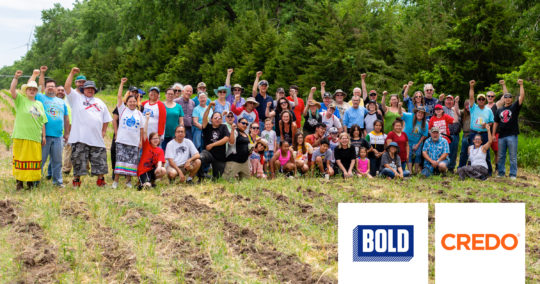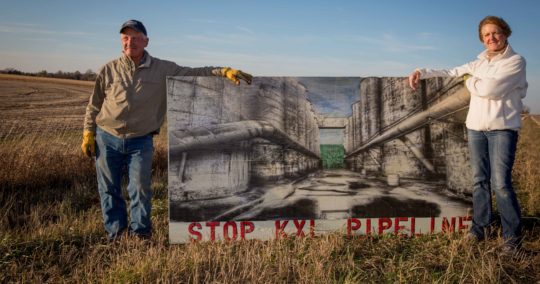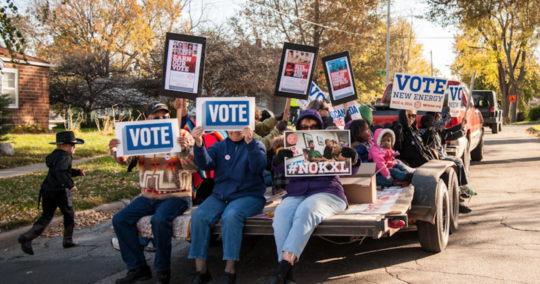

**Please note updated date/time**
Join Bold Nebraska and the KANEKO community for a Keystone XL Pipeline Fighter meetup on Saturday, Feb. 8 (1-3 p.m.) at KANEKO in Omaha. We’ll provide an update on the U.S. State Department’s review of TransCanada’s pipeline permit application, as well as an overview of the state of Nebraska’s public power landscape, and a preview of Bold Nebraska’s plans for a New Energy Voter campaign in 2014.
WHAT: KXL Pipeline Fighter Meetup + New Energy Voter 2014 Update
WHEN: Saturday, Feb. 8, 1:00 p.m. — 3:00 p.m.
WHERE: KANEKO, 1111 Jones St., Omaha, NE 68102 (map)
REGISTER: Please fill out the form below to register, then SHARE the event on Facebook
MEETING AGENDA
- Keystone XL: An update on the ongoing pipeline fight, including the forthcoming release of the U.S. State Department’s Final Envrionmental Impact Statement and National Interest Determination process for the pipeline, which are now expected to push Pres. Obama’s final decision on the pipeline into 2014.
- Update on State Dept. Inspector General’s investigation into conflict of interest and bias towards industry that were rampant in the environmental review of KXL.
- Review of attempts in Congress by Rep. Lee “Tarsands” Terry and others to rubber-stamp approval and fast-track the pipeline.
- Next steps: What landowners, farmers, ranchers and allies who care about protecting our land, water and climate can do over the winter to keep the campaign against KXL going strong.
- Nebraska’s Public Power: An overview of Nebraska’s unique publicly-owned energy utilities, and local efforts to encourage them to move away from coal and increase investment in clean, locally-produced renewable energy like wind and solar.
- New Energy Voter Campaign 2014: A preview of what Bold Nebraska and allied groups are planning during the 2014 election cycle.
- Candidates: Supporting candidates in non-partisan races (e.g. NPPD, State Leg) who believe in key issues (draft below and will be discussed at the meeting) we identified through conversations in our urban and rural towns.
- “Bold Boots”: Local campaign trainings in early 2014 for Pipeline Fighters and other citizens will help focus their energy and resources to work to help elect candidates who support our key issues.
- Key issues we will discuss at the meeting to ensure these are the items we want to see candidates focus on in 2014:
1. Become a national leader in renewable energy
- Rank top 5 nationally in wind energy production by 2025
- Rank top 15 nationally in solar energy production by 2025
- Promote energy efficiency through utility-based partnerships
- Increase tax incentives for small scale, individual renewable energy projects
- Reduce investment in finite resources such as coal and oil
- Create a pilot project fund for farm and ranch based renewable energy projects
2. Protect our water
- Incentivize water efficiency
- Designate the Ogallala Aquifer as a High Consequence Area
- Enhance Wellhead Protection Programs in communities across the state
- Heighten standards for tarsands pipelines including no tarsands pipelines in drinking water or Sandhills
3. Create a fair and sustainable food system
- Expand market opportunities for local food producers
- Increase access to community food processing
- Implement Farm-to-School programs
4. Keep government accountable to citizens
- No eminent domain for private gain
- Heighten responsiveness to constituents
- Increase transparency for any conflicts of interest or corporate payments made to elected officials
5. Support family farmers and ranchers
- Expanding local, national and international markets for Nebraska products
- Maintain country of origin labeling (COOL)
- Pass a meaningful Farm Bill
6. Modernize state infrastructure
- Create protected bike lanes in urban cities
- Replace aging drinking water, wastewater and gas distribution pipelines
- Increase broadband access statewide
- Encourage state-funded improvements to schools that include universal pre-k classrooms and health clinics



